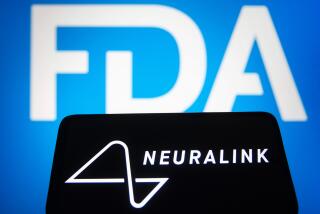Silicone Implant Maker Proposes Study : Health: Human trials to answer safety questions could forestall ban on the devices.
- Share via
WASHINGTON — The leading manufacturer of silicone gel breast implants Wednesday proposed a major human study--to be monitored by federal researchers--that would attempt to answer critical safety questions about the controversial devices.
If such a study is approved by the Food and Drug Administration, it could forestall an outright ban of the implants by providing a way to obtain needed data while allowing the devices to remain widely available.
“I view this as an all-stops-out proposition,” Dr. Robert LeVier, technical director for Dow Corning Corp.’s division of health care businesses, said in an interview. “This is going for broke. We will do all that has to be done.”
The idea for the clinical trial, which could involve thousands of women over many years, was presented before members of an FDA advisory panel who are deliberating whether the devices should remain on the market.
Officials from Dow Corning told the panel, when asked, that the company would be willing to allow scientists from the National Institutes of Health to oversee the study, along with the FDA.
The committee is expected to make a recommendation today after three days of hearings. FDA Commissioner David A. Kessler said the agency will make a final decision within 60 days of the panel’s recommendation.
The panel has a range of options that include calling for a permanent ban on the products or suggesting only limited availability--for breast cancer and trauma patients, for example, and women born with breast abnormalities.
But the committee could also recommend that the implants remain accessible under an Investigational Device Exemption, a regulatory category that would remove them from the general market but allow them to be widely available within a large-scale research program under federal control.
“No matter what happens, we want to do this study,” LeVier said. “The only thing that would stop us is a ban.”
The major scientific questions that such research would have to address include the health consequences of implant rupture--when the device breaks--and of slow leakage, or “gel bleed,” over time through the envelope surrounding the implant. Silicone is suspected--although such suspicions have not been documented--to be associated with the development of autoimmune diseases, including certain connective tissue disorders, and cancer.
LeVier, who estimated that the study would cost between $10 million and $20 million, said he hoped the research would also examine “the psychological benefits over time” of having implants.
Representatives from Dow Corning and three other companies that make the devices, McGhan Medical Corp., Bioplasty Inc. and Mentor Corp., said that their research had shown no link between the devices and autoimmune diseases.
Also, in response to research presented Tuesday that suggested the devices rupture at a rate of 6% or higher, Dow Corning officials again said their reports indicated a rate less than 0.5% during the last 30 years, and no greater than 0.5% in any given year.
“In fact . . . the actual rate is less than 0.2%,” said Robert T. Rylee, chairman of Dow Corning’s health care businesses division. But there might have been ruptures that could have been unreported, he acknowledged.
In other testimony, Rep. Marilyn Lloyd (D-Tenn.) delivered a stinging attack on the FDA for calling for a voluntary moratorium on use of the devices.
Lloyd, who recently underwent a mastectomy for breast cancer, was preparing to undergo reconstruction with a silicone implant when the moratorium, which began Jan. 6, was announced.
“I now wear a very uncomfortable prosthesis,” she said. “Every day I wear the prosthesis I am reminded of my cancer. My quality of life has been put on hold by this unjustified moratorium.”
Breast implants have been on the market for three decades, and an estimated 1 million to 2 million women have them. About 150,000 women every year have the surgery--80% of them for cosmetic reasons, the rest for reconstruction following breast cancer surgery.




